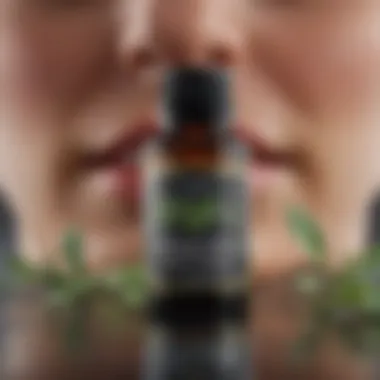Expert Strategies for Managing Cold Sores: A Comprehensive Guide


Beauty Trends
Managing Cold Sores, although primarily a health concern, can significantly impact one's confidence and appearance. The visible nature of cold sores often prompts individuals to seek ways to conceal or minimize their appearance with makeup. Exploring the latest makeup looks can provide valuable insights into techniques and products that effectively camouflage cold sores.
In addition to makeup, skincare routines play a crucial role in managing cold sores. Detailed guides on skincare can assist individuals in choosing products that are gentle on sensitive skin and help in reducing inflammation and promoting healing. Understanding how different skincare products interact with cold sores is essential for maintaining skin health and preventing further outbreaks.
When dealing with cold sores, it's important to consider how they can affect not just the lips but also the skin around them. Tailoring skincare routines to address the specific needs of the affected area can contribute to overall skin health and reduce the likelihood of recurrent outbreaks.
Fashion Tips
Fashion tips for managing cold sores go beyond simply choosing the right outfit. Understanding how different fabrics and styles interact with sensitive skin around the lips can be essential in preventing irritation and discomfort. Providing insights into fashion inspirations that focus on diverting attention away from cold sores can help individuals feel confident and stylish.
Accessories can also play a key role in diverting attention from cold sores. By featuring must-have accessories, individuals can draw focus to other areas of their outfit, minimizing the visibility of cold sores. Tips on incorporating statement accessories can further enhance one's overall look and boost confidence.
When transitioning wardrobes between seasons, it's important to consider how changes in weather can impact cold sore outbreaks. Tips on selecting clothing that provides both comfort and style while also accommodating the presence of cold sores can empower individuals to navigate seasonal transitions with confidence.
Wellness and Self-Care
Maintaining wellness and engaging in self-care practices are essential components of managing cold sores effectively. Articles on meditation and mindfulness can help individuals reduce stress levels, which can be a trigger for cold sore outbreaks. Implementing mental health tips geared towards women can promote emotional well-being and overall health.
Physical exercise and workouts are not only beneficial for general health but can also play a role in managing stress and reducing inflammation, which can aid in the healing process of cold sores. Offering tips on maintaining a healthy lifestyle can empower women to take control of their well-being and manage cold sores proactively.
Self-care ideas ranging from relaxation techniques to wellness practices can provide individuals with a holistic approach to managing cold sores. Prioritizing self-love and incorporating self-care routines into daily life can contribute to overall wellness and enhance the healing process.


Pop Culture Updates
Amidst the flurry of pop culture updates lie opportunities to discover new trends and entertainment distractions that can offer relief from the discomfort of cold sores. Staying updated on celebrities, red carpet events, and entertainment industry news can provide a welcome distraction and spark joy during flare-ups.
Critiques and recommendations on popular TV shows and movies can offer immersive experiences that transport individuals away from the stress of dealing with cold sores. Reviews of new music albums and songs provide avenues for escapism and enjoyment, fostering emotional well-being and serving as positive distractions.
Exploring different facets of pop culture can offer individuals moments of relaxation and entertainment that aid in diverting focus from cold sores. By immersing oneself in the latest pop culture trends, individuals can find moments of joy and respite amidst the challenges of managing cold sores.
Parenting and Family
For women balancing the challenges of parenting with managing cold sores, effective strategies and resources can be invaluable. Tips and tricks for parenting while dealing with cold sores can assist in maintaining a sense of normalcy and routine for both the individual and their family.
Suggesting family-friendly activities that accommodate the discomfort of cold sores can help create bonding opportunities that are enjoyable and stress-free. Articles on child development can provide insights into managing parenting responsibilities while prioritizing personal well-being.
Expert advice on parenting strategies can offer reassurance and guidance to individuals navigating the complexities of raising a family while coping with cold sores. By integrating effective parenting practices with self-care routines, women can strive to maintain a healthy balance and ensure the well-being of themselves and their loved ones.
Understanding Cold Sores
In the realm of health and wellness, delving into the intricacies of cold sores is paramount. Cold sores, also known as fever blisters, are common viral infections caused by the herpes simplex virus. Understanding this topic is crucial in navigating through the discomfort they bring and in hastening the healing process. By comprehending the underlying causes, symptoms, and stages of cold sores, individuals can equip themselves with the knowledge needed to effectively manage and treat these pesky sores.
What Causes Cold Sores
Cold sores are primarily caused by the herpes simplex virus (HSV-1). This virus is highly contagious and can be transmitted through close personal contact, such as kissing or sharing utensils. After the initial infection, the virus lies dormant in nerve cells until triggered by factors like stress, fatigue, or exposure to UV rays. Understanding the root cause of cold sores is essential for implementing preventive measures and minimizing potential outbreaks.
Symptoms of Cold Sores


The onset of cold sores is often heralded by a tingling or burning sensation around the mouth, followed by the appearance of fluid-filled blisters. These blisters can be painful and may crust over before healing. Other common symptoms include fever, sore throat, and swollen lymph nodes. Recognizing these symptoms early on can facilitate prompt treatment and prevent further discomfort.
Identifying the Stages of Cold Sores
Cold sores typically progress through several stages: the tingling stage, blister stage, weeping stage, and healing stage. At the tingling stage, individuals may experience itching or burning at the site of the future sore. The blister stage is characterized by the development of fluid-filled blisters, which can be both unsightly and uncomfortable. As the blisters rupture and release fluid, they enter the weeping stage. Finally, during the healing stage, scabs form over the sores, gradually falling off to reveal new skin beneath. Understanding these stages is vital for knowing how to best manage and treat cold sores throughout their lifecycle.
Consider Ice or Cold Compress The application of ice or a cold compress can offer relief and aid in managing the discomfort associated with cold sores. The cold temperature can help numb the area, reducing pain and inflammation. Moreover, the vasoconstrictive effects of cold therapy can limit the spread of the virus and potentially shorten the duration of the cold sore outbreak. Applying ice or a cold compress for short durations intermittently throughout the day can prove beneficial in soothing the affected area and promoting comfort.
Holistic Approaches to Soothe Discomfort
In this guide on managing cold sores, the section dedicated to holistic approaches plays a crucial role in providing alternative remedies for alleviating discomfort. Holistic treatments focus on addressing the underlying causes of cold sores and promoting overall wellness. By incorporating natural ingredients and methods, this approach aims to enhance the body's healing process and minimize the severity of outbreaks.
Aloe Vera Gel for Healing
Aloe vera gel is a popular natural remedy known for its healing properties. When applied topically to cold sores, it can help reduce inflammation, soothe irritated skin, and promote faster healing. The gel forms a protective barrier over the affected area, preventing further infection and promoting skin regeneration. Rich in antioxidants and vitamins, aloe vera gel nourishes the skin and supports its repair process, making it an effective treatment for cold sores.
Tea Tree Oil for Antiviral Benefits
Tea tree oil is recognized for its antiviral and antibacterial properties, making it a valuable ally in combating cold sores. When applied correctly, tea tree oil can help reduce viral activity, alleviate symptoms such as itching and burning, and accelerate the healing process. Its natural properties make it a gentle yet potent solution for managing cold sores, offering both relief and antiviral benefits without harsh side effects.
Lysine Supplements to Reduce Outbreak Duration
Lysine supplements have been studied for their ability to reduce the frequency and duration of cold sore outbreaks. As an essential amino acid, lysine plays a pivotal role in supporting the immune system and inhibiting the replication of the herpes simplex virus responsible for cold sores. By incorporating lysine supplements into your daily routine, you may experience fewer outbreaks and faster recovery times, ultimately minimizing the impact of cold sores on your overall well-being.


Preventive Measures and Lifestyle Adjustments
In this comprehensive guide on managing cold sores, an extensive focus is placed on understanding preventive measures and lifestyle adjustments that play a crucial role in cold sore management. Preventive measures are vital elements in reducing the frequency and severity of cold sore outbreaks. Lifestyle adjustments can significantly impact immune system function, thereby influencing the body's ability to combat the herpes simplex virus responsible for cold sores. By adopting a proactive approach towards preventive measures and lifestyle changes, individuals can potentially alleviate the impact of cold sores on their quality of life. Incorporating these strategies can contribute to long-term management and mitigation of cold sore symptoms.
Manage Stress Levels
Among the various factors that can trigger cold sore outbreaks, stress stands out as a significant contributor. Chronic stress weakens the immune system, making individuals more susceptible to viral infections like the herpes simplex virus. Managing stress levels is imperative in cold sore management, as it helps reduce the likelihood of outbreaks and minimizes the severity of symptoms. Implementing stress-reducing techniques such as mindfulness, meditation, yoga, or engaging in hobbies can aid in maintaining a balanced emotional state, thereby strengthening the body's defenses against cold sores.
Opt for a Balanced Diet Rich in Nutrients
The role of nutrition in managing cold sores cannot be overstated. Consuming a balanced diet rich in essential nutrients is crucial for supporting immune function and promoting overall health. Key nutrients such as vitamins C, E, and zinc play vital roles in immune response and skin health, which are integral in combating cold sore outbreaks. Including a variety of fruits, vegetables, lean proteins, and whole grains in the diet can provide the body with the necessary building blocks to enhance immune function and reduce the frequency of cold sore occurrences.
Prioritize Regular Exercise
Physical activity not only contributes to overall well-being but also plays a role in cold sore management. Regular exercise helps boost immune function, reduce stress levels, and improve circulation, all of which are beneficial in combating cold sore outbreaks. Engaging in moderate exercise, such as brisk walking, cycling, or yoga, can enhance immune response, promoting resilience against viral infections like the herpes simplex virus. Making exercise a consistent part of one's routine can aid in maintaining a healthy immune system and reducing the impact of cold sores on daily life.
Practice Good Oral Hygiene
Maintaining good oral hygiene is essential in cold sore management, as the herpes simplex virus primarily infects through the mucous membranes of the mouth. Practicing regular brushing, flossing, and using antiseptic mouthwash can help prevent the spread of the virus and reduce the risk of recurrent cold sore outbreaks. Additionally, avoiding sharing personal items like utensils or lip balm can minimize the chances of transmitting the virus to others. Incorporating good oral hygiene practices into daily routines can contribute to effective cold sore management and promote overall oral health.
Consulting a Healthcare Professional
In the realm of managing cold sores, consulting a healthcare professional is a pivotal step that holds significant importance in ensuring prompt and effective treatment. When grappling with the discomfort and unsightliness of cold sores, seeking the expertise of a healthcare provider can offer valuable insights and specialized care tailored to individual needs. This article underscores the critical role of healthcare professionals in addressing cold sores comprehensively, from diagnosis to treatment and prevention strategies. By consulting a healthcare professional, individuals can gain access to personalized guidance on managing outbreaks and minimizing their recurrence, leading to improved overall well-being.
When to Seek Medical Advice
Determining the optimal time to seek medical advice for cold sores is essential for timely intervention and optimal care. Generally, it is advisable to consult a healthcare professional if cold sore symptoms persist beyond a week, if there is a high frequency of outbreaks, or if the sores are accompanied by severe pain or abnormal symptoms. Additionally, individuals with compromised immune systems or underlying health conditions should promptly seek medical advice upon observing cold sore symptoms. Seeking medical guidance promptly can aid in ruling out any underlying health issues, receiving appropriate treatment measures, and preventing potential complications.
Treatment Options from a Doctor
Healthcare providers offer a range of treatment options to address cold sores effectively, tailored to the severity and frequency of outbreaks. Common treatments prescribed by doctors may include antiviral medications to reduce viral replication, topical treatments to alleviate symptoms, or oral medications to accelerate healing. In cases of severe or recurrent cold sores, healthcare professionals may recommend advanced therapies such as laser treatment or cryotherapy to target the sores directly. Consulting a doctor enables individuals to explore personalized treatment plans aligned with their specific needs and medical history, ensuring optimal management of cold sores for improved symptom relief and overall well-being.







